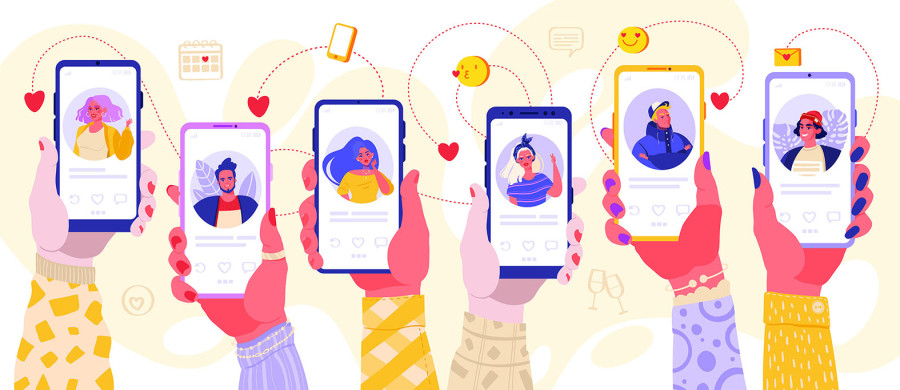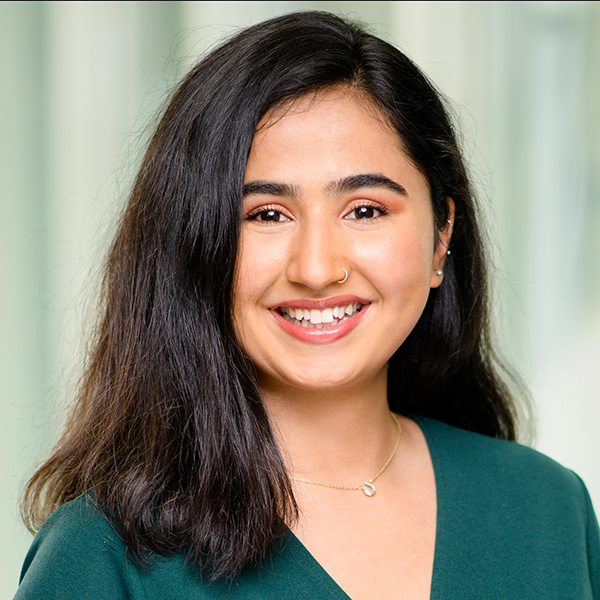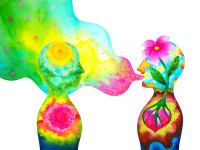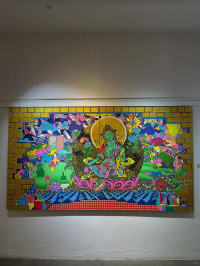Culture & Lifestyle
Dating apps aren’t just for dating and hookups
While users initially dealt with shame and guilt for being on the apps, over time they have found new friends, made business connections, and even found therapists.
Aakriti Ghimire
Every evening around 7 pm, in the comfort of their room, Sarva (name changed) swipes through people’s profiles–left and right–on dating apps Tinder and Bumble. When Sarva swipes right on an individual’s profile, if they have also swiped right, it’s a match!
Sarva, 22, who first started their online dating journey through Grindr–a dating app for queer people–in 2018, uses these apps with a very open mindset. They don’t know how their next match will unfold—if it will be a potential romantic partner or a new friend.
“When I was new to the world of dating apps, my motivation was to find queer friends to talk to. Ever since I started using Grindr and Tinder, it’s been easier to meet people and go out with them. Some end up being really great friends and some end up as potential romantic partners!”
Following the global trends of increasing online dating site users, there has been a boom in the Nepali online dating community ever since the pandemic. People in their 20s and 30s have now found themselves on different online platforms–Tinder, Bumble, Grindr, Tantan–to find new friends, connect with people of different avenues, and find romantic partners.
Despite the heavy misconception that dating apps are “sutne apps”–or apps primarily used for sexual encounters–users have been defining their own motives behind using such apps. Given the apprehension of Nepali society towards dating, users also deal with shame and guilt for being on dating apps.
Siddhartha (name changed), 32, believes that dating apps can actually help people make new friends, meet new people, and allow them to share personal stories. “A lot of people in our part of the world have a misconception about dating apps. They think that such apps are only for casual flings or one-night stands, but that's not entirely true,” says Siddhartha, who created his first dating app profile in March 2020, during the first lockdown. “The main reason why I am on dating apps is that I love interacting with people and making meaningful connections, rather than casual encounters.”
These apps have been really convenient for individuals seeking connections beyond their friend circle. It has helped in expanding their network to people they would have otherwise never met.
Twenty-five-year-old Elina (name changed) went abroad for her undergraduate studies, and after returning to Nepal, she started using dating apps to meet people beyond her friend circle. “I go out mostly to meet new people, and I have actually made a lot of female friends as well, through Bumble’s BFF option. And it might be hard to believe, but I have also made a lot of business connections through the app.”
Dating apps allow users to curate their own digital profiles by uploading their images, writing short biographies, their work, education, age, location, interests. Many also connect their social media platforms or add their favourite musicians.
However, these apps by default prioritise the user’s appearances based on the images uploaded by them.
Despite that, everyone interviewed by the Post shared that they didn’t emphasise as much on the individuals’ looks. They say that bios and interests played a crucial role in deciding whether to swipe left (dislike) or right (like).
“People usually value photos over personality. For me, it’s mainly the interests and the bio,” says Siddhartha, who works in digital marketing. Elina echoes Siddhartha’s thoughts.
There are, however, many profiles on these dating apps that are named ‘Anonymous’ or have a fake name, with no images of a real individual but have quirky bios. These accounts, too, get matches, even in the absence of images.
Jasmine (name changed), a third-year college student, shares that she also swipes right on these anonymous accounts that have no individual details. “I’m very curious about these anonymous accounts because it is evident that not everyone is comfortable on these apps. The majority of such people share that they are scared that someone they know will see them on these apps. They fear the stigmatisation that comes with being on such apps.”
Dating app users, mostly women and queers, identified two kinds of guilt associated with being on such apps–the first guilt of being ‘out there’ and the second guilt of making judgments about other users based on their digital profile, mostly pictures, bios, and interests.
Jasmine shares that she initially felt ashamed about being on these apps. “People generally assume that just because I am on dating apps means I am desperately searching for someone, which is not the case. That made me very uncomfortable and guilty about being on such platforms.”
However, after almost four years of experience, she laughs and says, “You get over the feeling of shame once you delete and download the app multiple times.”
Users also share feeling uncomfortable by the performativity of dating apps–deciding whether you like someone or not solely based on their digital profiles. Sarva, a third-year student of social work and literature at a college in Kathmandu, shares, “I remind myself that someone is judging me based on my profile and making decisions on whether they want to talk to me or not. And that’s what I am doing with others, too!”
Elina and Jasmine identify that this guilt arises from the fact that dating is shunned in Nepal.
"Ours is a society that takes a double look at people of opposite genders holding hands or walking with each other. So, when dating itself is an activity that has to be hushed, being on dating apps further amplifies that guilt," explains Jasmine.
Despite the dilemma, confusion, shame, and guilt associated with being on dating apps, users overcome them at their own pace. In a world where it's increasingly difficult to meet new people, dating apps have become a platform to connect with people, find love, and even therapists.
“I matched with a guy over Bumble, we met, but it was evident that we didn’t connect. So, we decided to remain friends,” shares Elina, who holds a degree in psychology.
“A month later he called me saying that he needs therapy. So now, I’m giving therapy to my bumble match twice a month.”




 14.24°C Kathmandu
14.24°C Kathmandu



.jpg&w=200&height=120)











